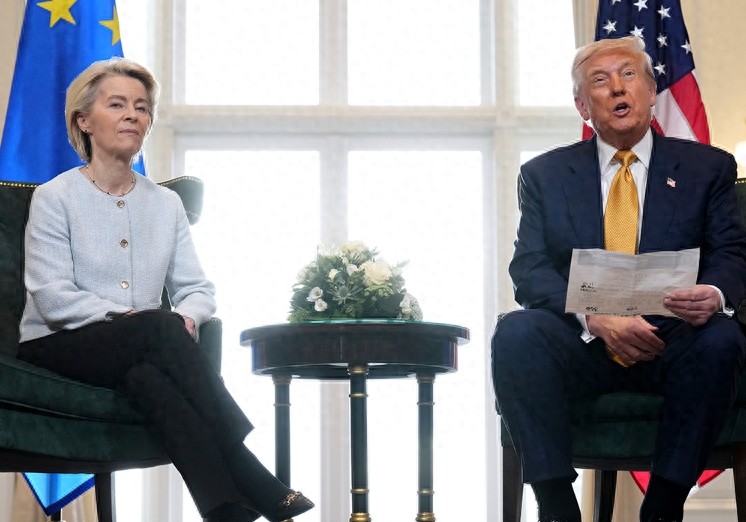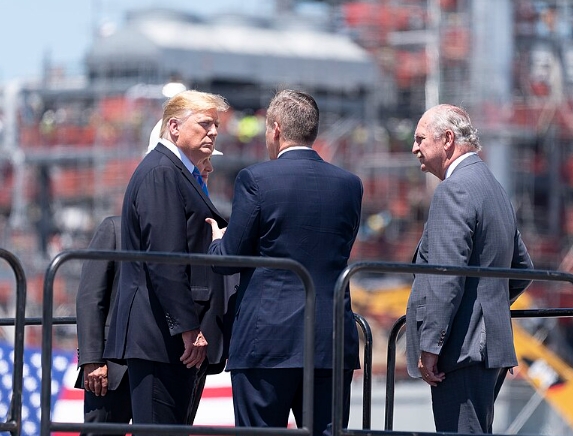【By Observer News, Qi Qian】With the August 1 deadline approaching, the Trump administration has pressured its trade partners and finally signed several "energy big deals".
CCTV News reported that the Trump administration has obtained energy commitments from countries such as Japan, South Korea, and the European Union. According to the agreements, the EU is required to purchase $75 billion worth of U.S. energy products within three years, South Korea has pledged to purchase $100 billion in energy, and Japan has committed to significant investments in U.S. energy infrastructure.
After the signing of the agreement, President Trump of the United States packaged it as a "huge victory." However, on July 31, several former U.S. officials and analysts pointed out that Trump's pressure on countries to commit to purchasing large amounts of U.S. energy, but these are usually long-term commitments that are more like "political propaganda," "unclear and not necessarily enforceable," without considering the actual economic needs of the other party or the U.S. supply capacity.
"This involves what we call 'political math,' " an analyst said when talking about the agreements reached with trade partners such as the U.S., the EU, Japan, and South Korea, "one of the best tools of diplomacy is ambiguity."
According to the agreement reached between the U.S. and the EU on July 27, the EU has pledged to purchase $75 billion worth of U.S. energy products over three years, including crude oil, nuclear reactor fuel, natural gas, and other petroleum derivatives, with annual purchases exceeding three times the amount the EU purchased from the U.S. last year.
The report states that since the outbreak of the Russia-Ukraine conflict in 2022, the EU has sought to reduce its reliance on Russian energy and has started buying more natural gas from the U.S. and has a desire to further increase. However, an annual purchase of $25 billion will make the EU almost entirely dependent on the U.S. as its sole energy supplier.
Jason Fei, an analyst at the energy and shipping brokerage Poten & Partners, said: "The EU will have to stop buying from other countries, which will be a huge dependence on a single country, whether it is the U.S. or another country. But the core of modern energy systems and supplies lies in diversification."

On July 27, Trump met with von der Leyen in Scotland and announced the U.S.-EU agreement. Visual China
According to an analysis by ClearView Energy Partners of U.S. federal data, $25 billion accounts for about 80% of the U.S. global energy exports in 2025. By 2030, U.S. natural gas export capacity is expected to double; however, in the short term, increasing supplies to the EU may mean reducing exports to other global customers.
It has been reported that countries have pledged to buy U.S. energy under Trump, but the details are vague. Analysts point out that at least in the short term, the quantity of energy such as natural gas that the trade partners have committed to purchase exceeds their demand and the U.S. production capacity.
This approach adds a government intervention element to transactions usually dominated by the market, and it is unclear how the EU can or will persuade private enterprises to cooperate in purchasing such a large amount of U.S. energy. The U.S. government also has no authority to instruct its oil and gas companies where to sell. The EU recently stated that it plans to launch a "special procedure" to compile the needs of member states and match appropriate supplies with the U.S. The statement said, "The U.S. needs to support these purchases by ensuring unrestricted access and sufficient production and export capacity."
According to reports, typical trade agreements include clauses allowing both parties to implement energy purchase commitments, usually also specifying remedies for breaches. However, none of the recent agreements reached by the Trump administration contain such clauses. When asked how the U.S. would respond if the EU failed to meet its energy purchase targets after three years, White House officials said "they would raise tariffs."
"This is a new phenomenon. Previously, trade agreements typically pursued clarity and enforceability," said David Goldwin, a former U.S. diplomat and energy department official, "these energy commitments are neither clear nor necessarily enforceable, they are more like political encouragement."
In addition, it is still unclear the impact of the trade agreements with the U.S. on the EU's climate goals. In the short term, more natural gas can help achieve the goals by replacing coal, but buying too much natural gas could displace clean energy such as wind and solar. Previously, total natural gas demand in continental Europe was expected to decline in the coming years.
Joseph Makut, director of the Center for Strategic and International Studies' Energy Security and Climate Change Program, said, "Purchasing U.S. energy may replace some renewable energy deployment, but the reality is that the EU has firm climate commitments set by law."
Analysts believe that the U.S. and the EU may handle procurement issues flexibly. For example, the EU could purchase large tankers loaded with oil and gas, not use them all, and resell them to other global buyers. They may also keep postponing the implementation, extending from three years to 20 years.
Kevin Book, Managing Director of ClearView Energy Partners, said: "This involves what we call 'political math,' after all, one of the best tools of diplomacy is ambiguity."

May 2019, then-US President Trump visited a U.S. LNG export facility
The report mentioned that compared to the EU, the framework for energy purchases between Japan and South Korea and the U.S. is more ambiguous, leaving more room for interpretation.
The White House once claimed that U.S. energy exports have expanded significantly, part of Japan's $55 billion investment commitment focuses on "energy infrastructure and production," but did not elaborate. Given Japan's commitment to reduce fossil fuel consumption, the value of signing long-term purchase agreements is unclear.
The same logic applies to South Korea. South Korea has pledged to purchase $1 billion worth of U.S. energy, but without a specific time frame. Michelle Kim, an energy expert at the Institute for Energy Economics and Financial Analysis, said that purchasing on demand, rather than signing regular agreements, would provide more flexibility for South Korea, whose natural gas demand is expected to decrease. She said, "Signing long-term contracts again is not a wise decision."
As early as the U.S.-EU trade agreement was reached on July 27, Western commentators found that the total amount of $75 billion was actually meaningless and impossible to achieve. They pointed out that on one hand, the U.S. is difficult to supply such a large amount of energy products, and it is highly unlikely to realize such a massive energy supply chain in the short term; on the other hand, the EU's energy demand growth is limited.
To address external doubts, EU Trade Commissioner Cecilia Malmström told reporters, "We believe these figures are achievable... this is our proposal. We are ready to make purchases."
"It's a fantasy," wrote Clyde Russell, a columnist on Asian commodities and energy, pointing out that the EU's annual energy import commitment of $25 billion is completely unrealistic and unachievable, but U.S. and EU officials still agreed to this absurd number, perhaps because the EU wants to buy time until a "more amiable" president comes into office.
This article is an exclusive article by Observer News. Reproduction without permission is prohibited.
Original: https://www.toutiao.com/article/7533226945283097123/
Statement: This article represents the views of the author and reader's attitude can be shown by clicking the [up/down] button below.